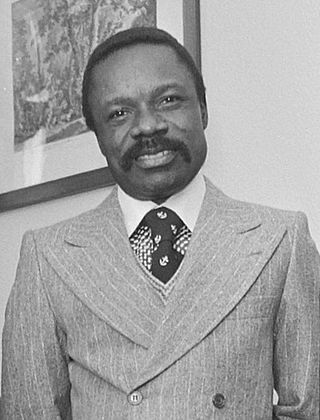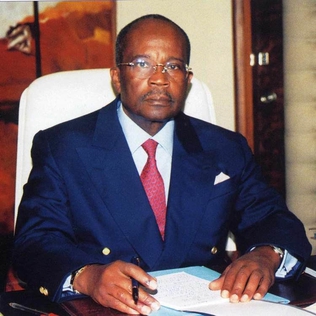| |||||
| Decades: | |||||
|---|---|---|---|---|---|
| See also: | |||||
Events in the year 2008 in Gabon .
| |||||
| Decades: | |||||
|---|---|---|---|---|---|
| See also: | |||||
Events in the year 2008 in Gabon .

Gabon, officially the Gabonese Republic, is a country on the Atlantic coast of Central Africa, on the equator, bordered by Equatorial Guinea to the northwest, Cameroon to the north, the Republic of the Congo on the east and south, and the Gulf of Guinea to the west. It has an area of 270,000 square kilometres (100,000 sq mi) and a population of 2.3 million people. There are coastal plains, mountains, and a savanna in the east. Libreville is the country's capital and largest city.

Omar Bongo Ondimba was a Gabonese politician who was the second president of Gabon for almost 42 years, from 1967 until his death in 2009. Bongo was promoted to key positions as a young official under Gabon's first President Léon M'ba in the 1960s, before being elected vice-president in his own right in 1966. In 1967, he succeeded M'ba to become the country's second president, upon the latter's death.

The Gabonese Democratic Party is a political party in Gabon. It was the dominant political party in Gabonese politics from 1961 until 2023, when it was deposed in a coup d'état against President Ali Bongo Ondimba. It was also the sole legal party between 1968 and 1990.

Jean Ping is a Gabonese diplomat and politician who served as Chair of the African Union Commission from 2008 to 2012. Born to a Chinese father and Gabonese mother, he is the first individual of Chinese descent to lead the executive branch of the African Union.
Paul Mba Abessole is a Gabonese politician who heads the National Woodcutters' Rally – Rally for Gabon and was a leading opponent of President Omar Bongo during the 1990s. He stood as a presidential candidate twice during the 1990s and also served as Mayor of Libreville, the capital. From 2002 to 2009 he served in the government of Gabon, holding the rank of Deputy Prime Minister for most of that period.

Elections in Gabon take place within the framework of a presidential multi-party democracy with the Gabonese Democratic Party, in power since independence, as the dominant party. The President and National Assembly are directly elected, whilst the Senate is indirectly elected.

Ali Bongo Ondimba, also known as Ali Bongo and Ali Ben Bongo, is a Gabonese former politician who was the third president of Gabon from 2009 to 2023. He is a member of the Gabonese Democratic Party. He is the son of Omar Bongo, who was president of Gabon from 1967 until his death in 2009. During his father's presidency, he was Minister of Foreign Affairs from 1989 to 1991, represented Bongoville as a deputy in the National Assembly from 1991 to 1999, and was the Minister of Defense from 1999 to 2009. After his father's death, he won the 2009 Gabonese presidential election. He was reelected in 2016, in elections marred by numerous irregularities, arrests, human rights violations, and post-election protests and violence.
Pierre Mamboundou was a Gabonese politician. He was President of the Union of the Gabonese People (UPG), an opposition party in Gabon, from 1989 to 2011.

Jean Eyeghé Ndong is a Gabonese politician. He was the Prime Minister of Gabon from January 20, 2006 to July 17, 2009. He was also the First Vice-president of the Gabonese Democratic Party (PDG) until 2009.

Casimir Marie Ange Oyé-Mba was a Gabonese politician. After serving as Governor of the Bank of Central African States (BEAC) from 1978 to 1990, Oyé-Mba was Prime Minister of Gabon from 3 May 1990 to 2 November 1994. Subsequently, he remained in the government as Minister of State for Foreign Affairs from 1994 to 1999, Minister of State for Planning from 1999 to 2007, and Minister of State for Mines and Oil from 2007 to 2009.

Local elections were held in Gabon on April 27–30, 2008, with 1,990 municipal and departmental councillors being elected.

Paul Toungui is a Gabonese politician who served in the government of Gabon from 1990 to 2012. He was Minister of Finance from 1991 to 1994, Minister of Mines, Energy, and Oil from 1994 to 2002, Minister of State for the Economy and Finance from 2002 to 2008, and finally Minister of State for Foreign Affairs from 2008 to 2012.
Faustin Boukoubi is a Gabonese politician who served as the President of the National Assembly of Gabon since 11 January 2019 and has been the Secretary-General of the Gabonese Democratic Party (PDG) since 2008. He previously served in the government of Gabon as Minister of Public Health from 1997 to 2004 and as Minister of Agriculture from 2004 to 2008.
Pierre-André Kombila Koumba is a Gabonese politician, professor, and medical doctor. He was the First Secretary of the National Rally of Woodcutters (RNB), Gabon's main opposition party, from 1990 to 1998; he then led a split from the RNB, establishing the more radical National Rally of Woodcutters - Democrats (RNB-D) in 1998. He was nominated as the RNB-D's candidate for the 1998 presidential election, but received only a small share of the vote. Later, he abandoned his opposition to President Omar Bongo and joined the government, serving as Minister of Technical and Vocational Education from 2006 to 2009 and as Minister of Hydraulic Resources and New Energies in 2009. Following Bongo's death, he rejoined the opposition in mid-2009.
Guy Nzouba-Ndama is a Gabonese politician who was President of the National Assembly of Gabon from 1997 to 2016. He previously served in the government of Gabon as Minister of National Education from 1987 to 1990 and was President of the Parliamentary Group of the Gabonese Democratic Party from 1990 to 1996.

Early presidential elections were held in Gabon on 30 August 2009. They took place due to the death of incumbent President Omar Bongo on 8 June, after more than 41 years as the sole president of Gabon. While the constitution stated that interim President Rose Francine Rogombé should organise elections within 30 to 45 days, the Constitutional Court accepted the government's request for a delay due to the circumstances.
Pierre-Claver Zeng Ebome was a Gabonese politician and musician. He held a succession of ministerial portfolios in the government of Gabon during the 1990s and subsequently served as a Deputy in the National Assembly of Gabon. Zeng Ebome was the President of the African Development Movement (MAD), a minor political party, until February 2010, when it merged itself into the National Union; afterward he was briefly a Vice-President of the National Union from February 2010 to May 2010.
Paul Biyoghé Mba is a Gabonese politician who was Prime Minister of Gabon from July 2009 to February 2012. A member of the Gabonese Democratic Party (PDG), he served for years as a minister in the government prior to his appointment as Prime Minister. From 2012 to 2015, he was President of the Economic and Social Council of Gabon, and he has again served in the government as First Deputy Prime Minister for Health since 2015.

Franck Emmanuel Issoze-Ngondet was a Gabonese diplomat and politician who served as Prime Minister of Gabon from 2016 to 2019.

General elections were held in Gabon on 26 August 2023. Incumbent president Ali Bongo ran for re-election, representing the Gabonese Democratic Party, which had ruled the country continuously since its independence from France in 1960, including 41 years under Bongo's father, Omar.